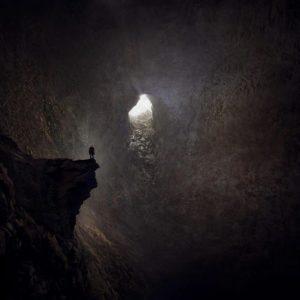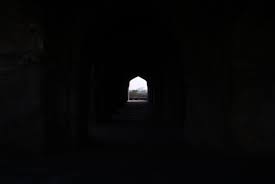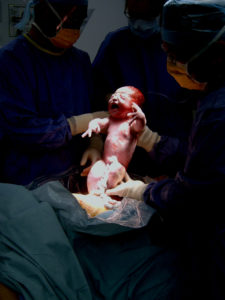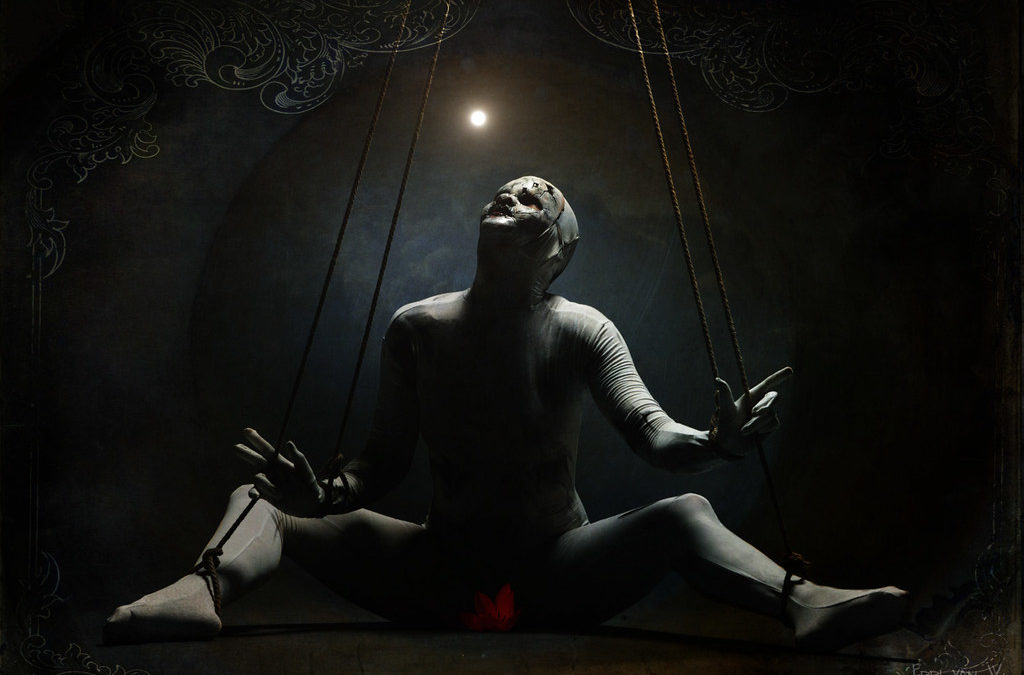The Womb Not The Tomb
On New Year’s Eve 2016 Rev. William Barber, co-founder of the Poor People’s Campaign, sponsored an interfaith Watchnight New Year’s Eve at Metropolitan AME Church in Washington, D.C. For many gathered that evening, there was a somber and sober feeling. Donald Trump had won the 2016 Presidential election and in just a few weeks he would be inaugurated as the 45th president of the United States. Trump’s surprise election victory over Hillary Clinton left many progressively-minded people in the country in a state of shock, depression, and anxiety. How could the lying, misogynistic millionaire narcissist have won? What would happen to the hard fought gains achieved during the Obama administration? What would happen to the country?
On that evening Valarie Kaur, a 35-year old Sikh activist and author, stood up to speak and noticed the grief and anticipation in people’s eyes. She spoke these words, “The future is dark. But what if — what if this darkness is not the darkness of the tomb, but the darkness of the womb? What if our America is not a dead country but a country that is waiting to be born? What if the story of America is one long labor? What if all our grandfathers and grandmothers are standing behind us now, those who survived occupation and genocide, slavery and Jim Crow, detentions and political assault? What if they are whispering in our ear, ‘You are brave.’ What if this is our nation’s greatest transition?”
When Kaur finished, shouts of “Hallelujah” came from throughout the church. She had spoken a word of hope into a dark and uncertain future. She had helped reframe the moment from one of defeat to one of a new world, a new nation waiting to be born.
The Darkness Deepened
 Despite the euphoria of Kaur’s image of the womb and a nation to be born that evening, over the next four years there was no “new birth,” no transformation of the systems and the entrenched forces that reinforced them. Trump proceeded to gut regulations addressing climate change, declared bans on people coming from Muslim-majority countries, tightened regulations regarding immigration, even placing thousands of migrant children in cages where they were treated like animals. He antagonized long-time allies and tried to bully adversaries. White nationalist groups emerged from the shadows in the knowledge Trump gave them his tacit support. For many, myself included, the Trump years seemed to plummet us as a nation into deeper darkness rather than the dawning of a new day.
Despite the euphoria of Kaur’s image of the womb and a nation to be born that evening, over the next four years there was no “new birth,” no transformation of the systems and the entrenched forces that reinforced them. Trump proceeded to gut regulations addressing climate change, declared bans on people coming from Muslim-majority countries, tightened regulations regarding immigration, even placing thousands of migrant children in cages where they were treated like animals. He antagonized long-time allies and tried to bully adversaries. White nationalist groups emerged from the shadows in the knowledge Trump gave them his tacit support. For many, myself included, the Trump years seemed to plummet us as a nation into deeper darkness rather than the dawning of a new day.
Then came the 2020 election and the concerted effort from Trump and his minions to overturn the clear results of the presidential election, ultimately resulting in the January 6 attack on the Capitol building by hundreds of Trump supporters pumped up with lies, and armed in military gear seeking to take by force that which they could not earn by a vote. Since then, Republicans have sought to rewrite the history of that day as if it was just a rowdy group of tourists, rather than an organized band of seditionists that they were. As I write these words, officials in Washington, D.C. are preparing for a demonstration in support who were arrested on for their role in the January 6 attack, touting them as some sort of heroes for justice. The insanity, absurdity and immorality of these actions just seem to plunge us into deeper and deeper darkness. As people have sought to make sense of the January 6, what started out as a series of lies and mistruths, has now grown to the Big Lie impacting all aspects of national life, even to the point of people refusing to take vaccines risking certain death for themselves and their loved ones.
The Dark Night of the Soul
Barbara Holmes, reflecting on these difficult times says we have experienced a “collective freefall” into a national dark night of the soul, “a place of breaking, relinquishment and waiting.” It is a time when the old ways of thinking and responding no longer seem to work, and where there is a lack of shared values or even hopes, a time “where nothing can be known and everything is on hold.”
the old ways of thinking and responding no longer seem to work, and where there is a lack of shared values or even hopes, a time “where nothing can be known and everything is on hold.”
In classic Christian spirituality, the “dark night of the soul” is a period in a person’s life when everything that one holds to be true and sure in their life seems ineffective and adequate. God seems absent and one feels they have lost their way. The concept of the dark night was first described by the 16th-century Carmelite monk St. John of the Cross. In defiance of an order from his superior, John helped his fellow Carmelite, Teresa of Avila, start a new convent. For his “disobedience,” John was attacked by some Carmelite brothers and thrown into solitary confinement, where he stayed for eight months until he was able to escape. In those months John experienced the total absence of God and hope, and yet came to the realization that even in the darkest, deepest hole one was not beyond the reach of God’s loving care. The dark night, he realized caused him to trust and to hope in ways that previously seemed impossible.
Contemporary spiritual writer, Thomas Moore says that the dark night of the soul is “a period of sadness, trial, loss, frustration or failure that is so disturbing and long-lasting” it makes you question the very meaning of life. Episcopal priest Barbara Brown Taylor in her book Learning to Walk in the Dark says that while the times of darkness can be unsettling and uncertain, they also invite one to learn about God, self, and the world in which we live. What these writers describe is an individual experience, but in our case, we are experiencing the descent of our whole American population into a period of unsettling uncertainty and loss of direction. Words like “freedom,” “justice” and “rights” have become words of defiance and division, rather than words describing our shared inheritance as Americans.
The Dark Night of Our National Soul
The dark night of our national soul is frightening and even depressing, but it is not without hope. If we stay with it long enough and don’t just give up, this state of not knowing can lead to a place of deeper understanding. Barbara Holmes writes: “The darkness … is an involuntary centering in a reality that is not always available to us when our egos are lit. Crises open portals of deeper knowing.” This deeper knowing is a call to see what lies behind the fear, the hate, the rejection and denial. The fact is this development of the Big Lie has come in response to the national awakening in 2020 to the reality of racism in our systems: law enforcement, health care, education, politics and more. What those who have suffered from these inequities have known all along, have become general knowledge, and in an attempt to suppress what is widely known, Conservative leaders are now banning these realities even being mentioned in schools. But the cat is out the bag, and this attempt at covering with the Lie will ultimately fail.
 Valarie Kaur says that the most dangerous and painful part of the birthing process is the final stage, often called the transition. The cervix is stretched to the full, contractions are rapid and intense and the woman feels like she is dying. Kaur describes transition as a metaphor for what one or a group must endure and go through to bring forth a child, a new world, a new perspective. I find this image of the darkness of the womb and the agony preceding birth as helpful insights to our national dark night of the soul. If as Dr. King so eloquently stated that “the arc of the universe bends toward justice,” our efforts will prevail. I will be the first to acknowledge, on many occasions I have doubted Dr. King’s words. And yet thinking of this period as a dark night of our national soul gives me hope, because like St. John of the Cross, while it may feel like God and hope have abandoned us, the promise is that in spite of appearances, God is present and hope is not lost.
Valarie Kaur says that the most dangerous and painful part of the birthing process is the final stage, often called the transition. The cervix is stretched to the full, contractions are rapid and intense and the woman feels like she is dying. Kaur describes transition as a metaphor for what one or a group must endure and go through to bring forth a child, a new world, a new perspective. I find this image of the darkness of the womb and the agony preceding birth as helpful insights to our national dark night of the soul. If as Dr. King so eloquently stated that “the arc of the universe bends toward justice,” our efforts will prevail. I will be the first to acknowledge, on many occasions I have doubted Dr. King’s words. And yet thinking of this period as a dark night of our national soul gives me hope, because like St. John of the Cross, while it may feel like God and hope have abandoned us, the promise is that in spite of appearances, God is present and hope is not lost.
So, while we work and fight for justice on many fronts, let us stay rooted in the hope that Valarie Kaur proclaims, that the struggle and unknowing we experience is the gestation period and the transition to a newer, better, and more just tomorrow. While as a man I have never given birth, on three occasions I have watched my wife go through the agony of the birthing process to bring our three daughters into the world. So too, our struggles for justice will bring forth a new order and a new society where equity, love, justice, and hope prevail.
(Images from Creative Commons)
Sources mentioned
Barbara Holmes (2021). Crisis Contemplation: Healing the Wounded Village. CAC Publishing
Valarie Kaur (2020). See No Stranger: A Memoir and Manifesto of Revolutionary Love. One World/Random House.
Thomas Moore (2004). Dark Nights of the Soul: A Guide to Finding Your Way Through Life’s Ordeals. Penguin Books.
Barbara Brown Taylor (2014). Learning to Walk in the Dark. Harper Collins.


Hey Dr Boyd great insight. The only thing I would like to point out is that for Black and Brown people there has always been this sense of unsettling and uncertainty in this country. We are still trying to attain our humanity. And if I can be honest it would seem to me and again this just my humble opinion it would seem that white people are predominately the ones confused about this nations inheritance it terms of what it means to be American. Blessings